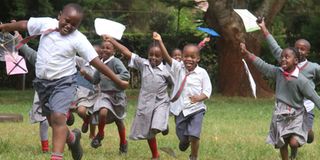Urban schools perform better in inaugural Grade 3 CBC tests

Pupils fly kites during environmental activities at Nyeri Good Shepherd School on January 22, 2020.
What you need to know:
- The overall performance shows that girls performed better than boys and met and exceeded the assessment expectations in English, Mathematics and Kiswahili.
- A majority of the learners who performed at Level 1 were aged above nine years.
Regular learners were tested in English and mathematical activities.
Learners in rural schools were unable to read and write, compared with those in urban schools, and girls did better than boys in the first Grade 3 assessment done since the new curriculum started, results released by the Kenya National Examinations Council (Knec) show.
The results are based on assessment done on pupils last year. The report seen by the Sunday Nation shows that schools in urban areas met and exceeded the assessment expectations in all the English Language tasks.
The overall performance shows that girls performed better than boys and met and exceeded the assessment expectations in English, Mathematics and Kiswahili.
More girls met assessment expectations in English listening, speaking skills and reading aloud skills than boys. But more boys did better in geometry.
“There were many learners who performed below expectation in Kiswahili “Kuandika njia mbalimbali za kutunza usafi sokoni,” says the report.
Teachers scored and analysed learners’ achievements in the assessment using four performance levels: Level one meant they were below expectation, level two they were approaching expectation, level three they met expectations and level four they exceeded expectation.
“A high percentage of learners from schools in rural areas performed at Level 1 in Reading Comprehension, Language Structures and Functions, representing 25.07 perc ent, and Writing Skills representing 23.91 per cent,” reads the report.
Aged above nine years
A majority of the learners who performed at Level 1 were aged above nine years.
“A significant percentage of learners in schools in urban areas performed at Level 1 in Reading Comprehension, Language Structures and Functions (14.36 per cent) and Writing Skills (14.20 percent).”
For learners in schools in urban areas, a big proportion performed at Levels 3 and 4 in all English Language tasks.
Knec was testing various competencies such as communication and collaboration, critical thinking and problem solving, imagination and creativity, citizenship, digital literacy, learning to learn and self-efficacy.
Regular learners were tested in English and mathematical activities.
Integrated Learning Assessment was also done in subjects such as Kiswahili Activities, Environmental Activities, Movement and Creative Activities, Religious Activities, Hygiene and Nutrition.
For special needs, learners were assessed in communication, social and pre-literacy skills and activities of daily living skills and religious education.
Integrated Learning Assessment was done on Sensory Motor and Creative Activities, Orientation and Mobility Skills and Pre-numeracy Activities.
The overall performance shows that a majority of learners met the assessment expectations.
“The conduct of the 2019 MLP Grade 3 was successful and a national analysis of learners’ performance indicates that a majority performed at Level 3 (Meeting Expectation) and Level 4 (Exceeding Expectation) in various tasks and strands. On the whole, learners’ progress in performance can be summarised as ‘Meeting Expectation,’” says Knec.
In English Language Activities, learners met expectations at Level 3 across all tasks.
Of the four tasks, learners’ achievement was best in Listening and Speaking and Signing Skills at 35.85 per cent, followed by Reading Comprehension and Language Structures at 33.03 per cent.
Writing skills
Learners were weaker in Writing Skills at 32.60 per cent and Reading Aloud at 31.68 per cent.
In Mathematical Activities, learners met expectations at Level 3 across the three strands, with the best achievement in Measurement at 44.55 per cent followed by Geometry at 41.37 per cent and Numbers at 34.04 per cent.
In the special needs schools, the performance in Communication, Social and Pre-literacy skills was at Level 3 in five of the six activities.
Some 1,282,150 learners in 37,374 schools were assessed. Of these, 604,522 (47.15per cent). Learners with special needs were 5,224 learners out of whom 2,125 were in regular schools.
The data analysis and report writing for the assessment was done from January 9 to February 28 this year
The identification and enrolment of 2019 MLP Grade 3 learners countrywide was done through a Knec portal between July 1 and August 30, 2019.
The Integrated Learning Assessment tool was uploaded on July 11 and schools were expected to administer it in two months.
The English Language Activities and Mathematical Activities assessment tools as well as the assessment guidelines and scoring rubrics were uploaded on September 10 last year.
Administration of English Language Activities and Mathematical Activities assessments began on September16.
“Schools downloaded the tools and administered them using the most convenient method such as printing, photocopying, projecting, tablets or writing on the board,” says the report.
On completion of the assessments, the class teachers scored and gave feedback to the learners on their performance.
To facilitate analysis of performance at the national level, teachers uploaded the learners’ performance levels on the Knec Portal
“The outcome of the assessment will be used at the school level to give feedback to learners on their levels of achieving the competencies in Early Years Education, while also informing teachers who will receive the learners in Grade 4 on the entry behavior of the Grade 3 learners,” reads the report.
The Monitoring of Learners’ Progress will also be used at the national level to inform policies regarding CBC implementation, specifically in curriculum development, teacher capacity and other policies related to quality.
According to Knec, by the end of August 2019, 215,253 primary school teachers, 1,075 Curriculum Support Officers (CSOs), 600 tutors from 30 Teacher Training Colleges had undergone capacity building on Competency based curriculum and Competency based assessment.





